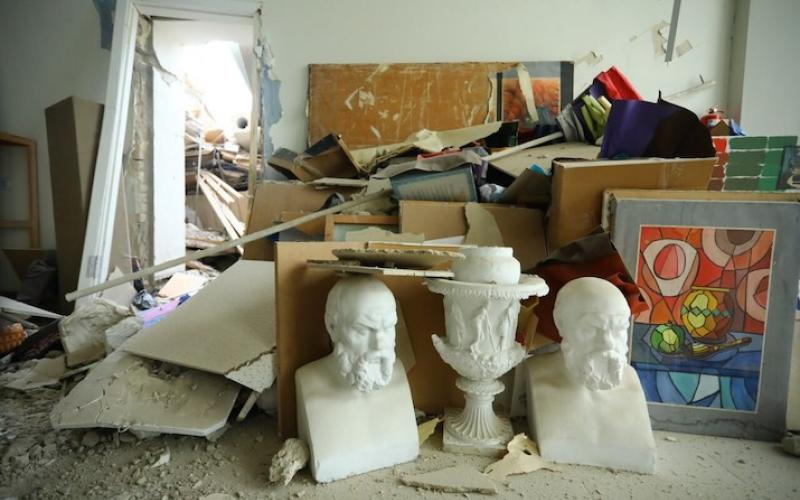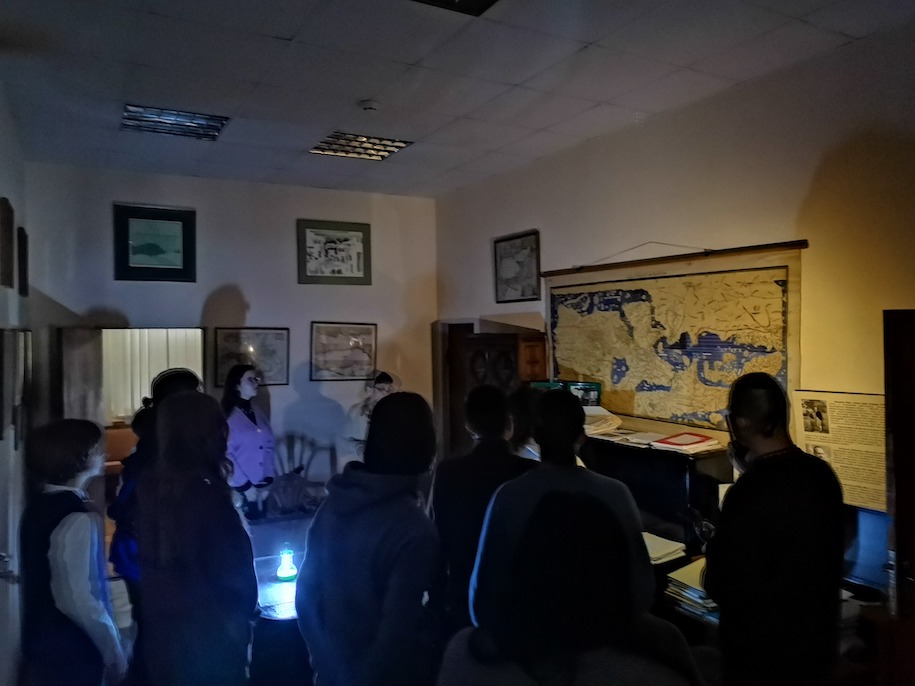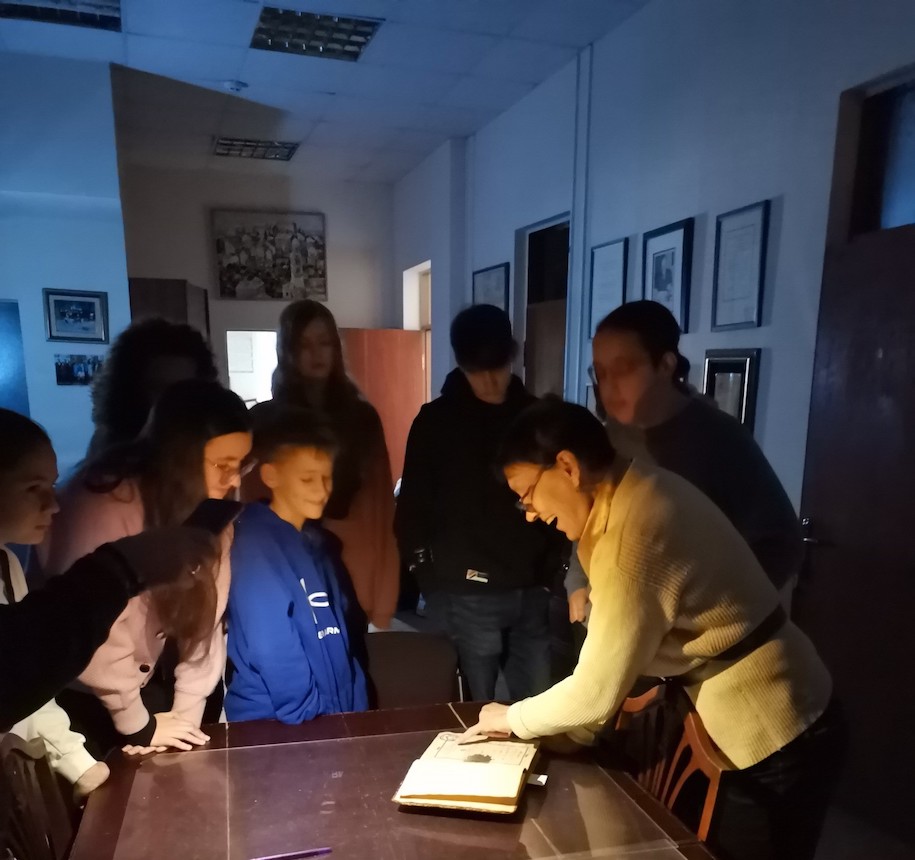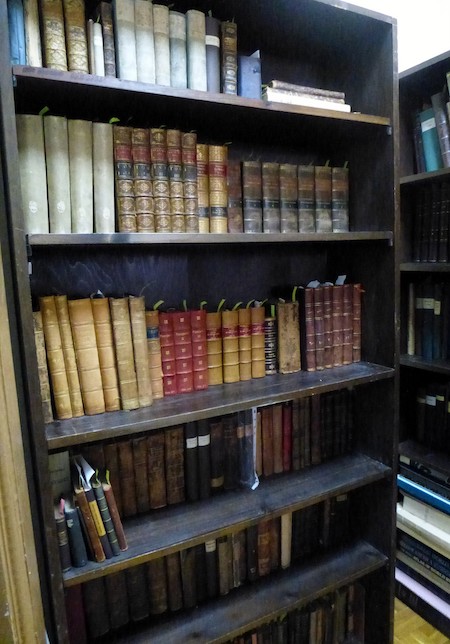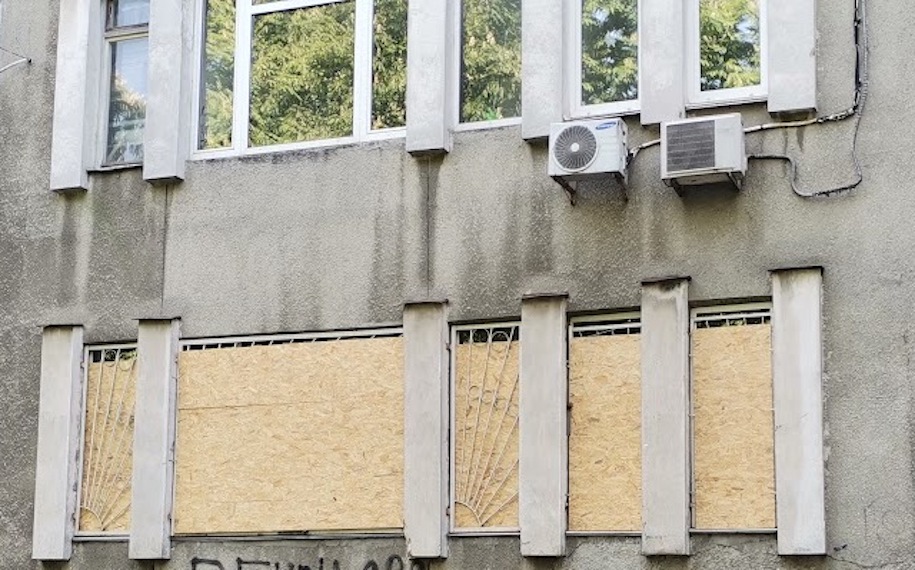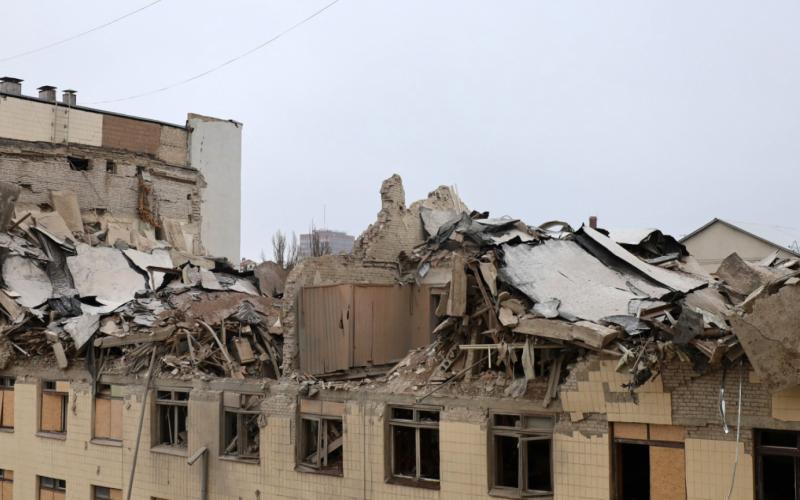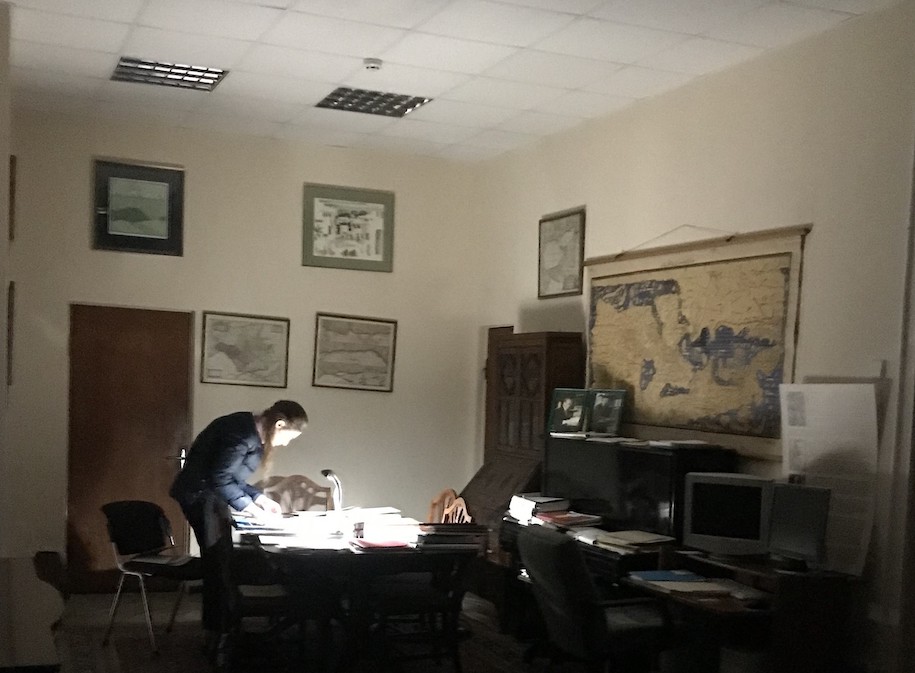
Despite systematic drone attacks, long-hour alarms, and blackout the Omeljan Pritsak Memorial Library was functioning. Fotos: Prof. Dr. Volodymyr Potulnytskyi.
Trying to Secure Workplaces Under Constant Attack
Upon our return to Kyiv in May, 2022 I relocated my research work to the library of the National University of Kyiv-Mohyla Academy, which had reopened. In the time span for more than one year (from May 2022 till June 2023) I have been working at the Memorial Library of the renowned scholar Omeljan Pritsak, housed at the National University “Kyiv-Mohyla Academy”. Taking into account, that from February 24 to the end of March 2022, the Russian troops tried to capture Kyiv, constantly shelling the city, the most valuable manuscripts, rare editions, and archival documents from Pritsak’s collection were hidden elsewhere and will remain there until the end of the Russian aggression.
Since Russian missile attacks on Ukraine and Kyiv with destruction and casualties occur constantly, the university implemented a series of measures to physically protect the premises of Pritsak Memorial Library. In particular, to prevent the windows of the Pritsak’s Library from breaking and to protect the collection from moisture and low temperature, the windows were closed with protective shields. Such seemingly simple protection of windows is effective even during missile attacks, namely against the destruction of the explosive wave and fragments of missiles and drones. Kyivans and, above all, museum workers and librarians have repeatedly seen evidence of this.
However, we were faced with a new challenge: the onset of systematic power and heating cuts that lasted for extended periods, sometimes spanning 6 to 8 hours daily until early 2023. Because of this we had to work with flashlights for hours. Despite systematic drone attacks, long-hour alarms, and blackout, the Pritsak Memorial Library, like the libraries and other units of NaUKMA, was functioning all the time. In the same way, as it used to be prior to February 24, 2022, visitors (students, scholars, and even schoolchildren) come to Pritsak Memorial Library. When alarms wereannounced, all of us (the employees and users of the Pritsak Memorial Library) went to a specially equipped shelter.
Gradually, we received updates regarding the situation at our institute, which had suffered significant damage during bombing the previous October. In Kyiv, for example, as result of missile attack on October 10, 2022 the windows and the facades of 7 museums, of the Teacher’s House, of the Institute of Ukrainian Archeography and Source Studies of Academy of Sciences and of Taras Shevchenko University were primarily damaged.
Consequently, employees were prohibited from visiting the institute, and all Academic Council meetings were conducted exclusively online. Despite these challenges, I tried to deliver my planning lecture course, titled “Global History of Ukraine from the Medieval Times to the End of the First World War,” to postgraduate and doctoral students. Spanning from October 2022 to April 2023, the entire course was conducted online, as we adapted to the limitations imposed by the prevailing circumstances. However, it was not without its share of disruptions. Lectures frequently had to be cancelled or rescheduled due to enemy air raids, drone activities, and other threats with the necessity to be in a shelter. The situation was compounded by the fact that most of the graduate students were not based in Kyiv; their respective cities were also subjected to bombings, resulting in widespread power outages and disrupted internet connectivity that rendered conducting lectures impossible. Despite these challenges, I concluded the lecture course, and the PhD students passed their exams.
Moreover, we together with my wife had the opportunity to actively engage in various academic conferences, including a significant international symposium titled “Survival Strategies for Ukraine.” This symposium took place in Tokyo and Sapporo, Japan, from 22nd to 24th February, coinciding with the anniversary of the full-scale Russian invasion. Despite Kyiv being subjected to an air raid and subsequent alerts during the conference, we were trying to participate online actively, ensuring our presence was felt and our contributions were made.
The Price, Ukrainian Historians pay
When assessing the current state of Ukrainian science in general and historical science in particular, it is important to take into account the deformations caused by the war. Since February and March, eight scholars and post-graduates from our institute have joined the Ukrainian Armed Forces, including PhD, doctoral candidate, historian of modern times Mykola Kravchenko who was killed by Russian invaders in Mariupol in 2022 and PhD, medieval historian Dmytro Rybakov, who was killed by Russians near Melitipol in 2023. Since February 2022 some female researchers have been abroad in refugee status (including 8 scholars and 2 postgraduates from our institute). Some scholars have not been able to produce research papers since February 2022 because of stress, depression, lack of concentration, and the need to stay constantly in shelters with no light, internet, heating, or water. Some of Kyiv scholars left Kyiv and moved to other cities, some were in temporarily occupied territories, hid in basements for months, and were under constant fire. Thus, part of them cannot psychologically return to normal, let alone write papers or give lectures, and it is unclear when they will be able to do so. Also, all territory of Ukraine is constantly shelled and attacked with missiles, drones, etc.
As a result, Ukrainian historians are now in survival mode. But we will eventually realize why we are in this situation. Despite this, we can already state that one reason for the current situation is that Ukrainian historical science remained essentially post-soviet in the approach, planning, and organization of the scientific process. This was also due to the fact that the state despised science, education, and culture, and financed them on a residual basis.
The unknown future of Ukrainian History
Yet, my opinion is that the most important challenge for Ukrainian historical science is to create a view of Ukrainian history that is consistent with world history. The problem is that Ukrainian history, on the one hand, and world history, on the other, still exist separately. Therefore, Ukrainian historical science needs to find a solution that integrates Ukrainian history with world history, and world history with Ukrainian history. Creating such a history will require Ukrainian historians to renounce many myths created by their predecessors and contemporaries, and we also need to encourage our neighbours, first, to learn more about our history, and second, to renounce their own myths.
Why is it important for Ukrainian historical science to create a Ukrainian history that integrates into the world history system? Until this is done, Ukrainian historians will make no headway, since they will always face this dichotomy: world history on the one hand, and Ukrainian history on the other. My opinion is that Ukrainian historical science must address three issues on the way to solving this problem: conceptual, generational, and methodological ones.
Thus, the main task facing Ukrainian historical science is to raise it to the international level and thereby help Ukraine as a state and a nation. The humanitarian section of the Academy of Sciences needs a radical reform aimed at solving a twofold problem: the integration of Ukrainian historical science into the world and the use of the most modern methodology instead of the antiquarian one. This option, in my opinion, is the only acceptable one. Naturally, until the war ends and the situation normalizes, it will be difficult to arrange such essential modification.
Thus, there will be the opportunity to implement substantial reforms, since during the 30 years of Ukraine's independence, only partial, surface and adaptation steps took place. Such reforms should bring about constructive changes in the education system and in the humanitarian section of the Academy of Sciences, contribute to the change of generations in their management, ensure conceptual and methodological metamorphosis, where education would be integral to science and serve as an example for educating new types of scholars. As a result of such an essential reform, each new generation will see an example for themselves and the opportunity to engage in science as a vocation, and not only through employment or earning. Appropriate tasks would be set before the younger generation, who would be brought up on more or less moral grounds, in the conditions of competitive recruitment, and they would see the example of Western scientists.
I am convinced that we will win the war with Russia thanks to the heroic armed forces of Ukraine, the support of a united Ukrainian society and reliable allies - the foreign partners from all progressive countries of the world. In turn Ukrainian historians will continue to fulfil its mission - to make constructive research, popularize the achievements of world science and teach high academic values.
Leipzig, 30.09.2023
Zitation
Volodymyr Potulnytskyi, Research Work of a Historian in Ukraine. In the Conditions of Russian-Ukrainian War , in: Zeitgeschichte-online, , URL: https://zeitgeschichte-online.de/themen/research-work-historian-ukraine

